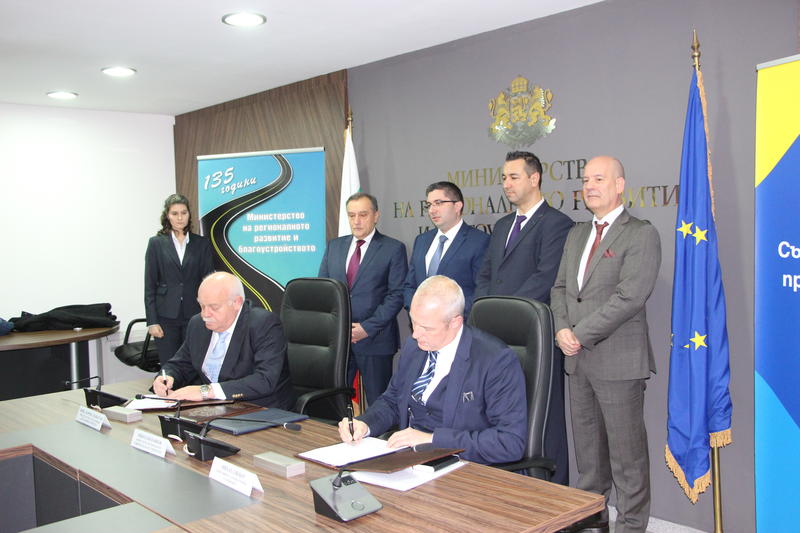The building of the toll system begins
The building of the toll system begins
By Ministry of Regional Development and Public Works
Payment of tolls by drivers will be monitored by traffic cameras
The contract for the design, building and launching of an electronic toll system for national road network was signed today in the presence of Nikolay Nankov, Minister of Regional Development and Public Works. The document was also signed by Eng. Doncho Atanasov, Chairman of the Board of Road Infrastructure Agency, and Michael Weber, representing the contractor - CONSORTIUM KAPSCH TRAFFIC SOLUTIONS. The ceremony was also attended by Eng. Veselin Davidov and Eng. Svetoslav Glosov, members of the MB of the Road Infrastructure Agency, and by André Laux, Chief Operating Officer of KAPSCH TRAFFICCOM.
The toll system will be based on the distance traveled for vehicles with a total technically permissible maximum mass over 3.5 t (toll) and time-based for passenger cars with a total technically permissible maximum mass of up to 3,5 t (electronic vignette).
The contract for the building of the electronic system for collecting the tolls for using the national road network is worth BGN 149,997 million excluding VAT. The deadline is 19 months. Its building will be at the expense of the contractor. After successful deployment, the revenues will return the investment. It is expected that in the first year of system introduction they will reach BGN 1 billion.
Minister Nankov explained that during the seven-month period in which the system will be designed, built and introduced, the necessary analyzes and public discussions will be made so as to make an expert and political decision on its tariff and scope. 12 months are provided for the so-called “system audit”, when the efficiency, functionality and achievement of the set parameters in terms of tolls and electronic vignette will be verified.
“Furthermore, a state-owned company will be set up to operate the system after its introduction. The generated revenues will be invested in the maintenance of the national road network and the completion of the motorways in the country,” the Regional Minister said.
The implementation of the combined electronic system will introduce a fair pricing model that will allow our country to benefit from its geostrategic position. Heavy truck tolls will increase 6-7 times. No increase in the prices of any kind of electronic vignette is foreseen, but there will be options for more flexible car tariffs such as a weekend vignette or a one-day vignette.
At present, 70% of revenue is generated by passenger cars. The vignette proceeds in 2017 amounted to almost BGN 352 million. The revenues from the sale of various types of car stickers amounted to approximately BGN 249 million, while the vignettes for trucks over 3.5 t were BGN 103 million. Last year’s revenue was BGN 25 million more than in 2016 when it was almost BGN 327 million. This increase was due to 700 thousand stickers more sold in 2017 compared to 2016. Last year, drivers of passenger cars and heavy trucks purchased a total of 7.5 million stickers, compared to a total of 6.8 million stickers sold in 2016.
“The introduction of the toll system will allow for the management of heavy-load traffic through economic constraints - higher tolls in peak hours,” Nikolay Nankov announced. International traffic across the country has increased many times and one-day vignette for heavy trucks costs BGN 23. For comparison, the toll for crossing a 90-kilometer motorway in Serbia costs almost BGN 20.
The Minister explained that the payments of the tolls would be monitored by traffic cameras and this would also contribute to anti-smuggling. Cameras will also record the average speed that will help combat the war on the roads.
According to Eng. Doncho Atanasov, Chairman of the MB of the Road Infrastructure Agency, the biggest challenge in the forthcoming work will be the training of the required staff and the work with the toll system. In response to a question, he pointed out that about 6-7,000 km of the national road network were in poor condition. The annual shortage for maintenance of the roads in our country is between BGN 200 million and BGN 300 million, but within 4-5 years after introducing the toll system, the road network in the country is expected to become even better.
As part of the technological equipment necessary for the operation of the toll system, 500 terminals will be built, delivered or installed to purchase route cards (pre-paid tickets) and to register and issue electronic vignettes; 100 fixed control points (toll gates); 100 control points for automatic weighing in motion; 50 laser scanning and gauging devices; 1 management and monitoring center; 2 servers and complete software for all components and processes; 55 cars for mobile control, etc.








